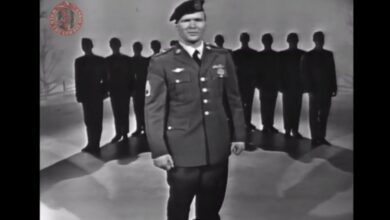This 60-year-old classic beats modern hits, with Elvis still unmatched in brilliance.
Elvis Presley’s version of “Return to Sender” is a vibrant showcase of his remarkable talent and an emblem of the early 1960s musical scene. Released in 1962, the track perfectly captures the distinctive blend of rock and roll with pop influences that characterized much of Presley’s work during this era. The song was crafted by the talented songwriting duo Winfield Scott and Otis Blackwell, whose collaboration resulted in a catchy melody that resonated deeply with audiences. “Return to Sender” features an upbeat rhythm and playful, yet poignant lyrics, allowing Presley to deliver a performance that is both lively and rich in emotional resonance.
The story conveyed in “Return to Sender” strikes a chord with many listeners, as it narrates the tale of a love letter returned to its sender, symbolizing miscommunication and lost romantic possibilities. This theme of unfulfilled desires and nostalgia evokes a sense of relatability in the song. Elvis’s interpretation elevates it from a mere pop tune to a narrative that explores the complexities of human relationships. His captivating delivery invites listeners to reflect on their own personal experiences, making it a lasting narrative within the fabric of music history.
Upon its release, “Return to Sender” quickly climbed the charts, reaching number two on the Billboard Hot 100. Its lively tempo and engaging storyline captured radio audiences and solidified Elvis as a beloved figure in popular music. The song’s success further enhanced his rising stardom, showcasing his versatility as an artist. With its infectious tune and memorable chorus, “Return to Sender” embodies the spirit of early ’60s pop culture while remaining timeless, demonstrating how music can adapt and still connect with listeners across generations.
The influence of “Return to Sender” has transcended its original release, with countless artists performing covers across various genres. From Bryan Ferry to appearances in The Beatles’ live shows, Elvis’s iconic performance has inspired numerous interpretations. These adaptations underscore the song’s universal appeal and its capacity for fresh reinterpretation, illustrating how a well-crafted melody and relatable lyrics can resonate through changing musical landscapes.
Born on January 8, 1935, in Tupelo, Mississippi, Elvis Presley emerged as a music legend in the mid-1950s through recordings for Sun Records, eventually signing with RCA Victor. His innovative fusion of musical styles, including country, blues, and gospel, set him apart in a competitive era. Elvis’s versatility was evident not only in his vocal prowess but also in his electrifying performances, which redefined stage presence in popular music and left a lasting impact on the industry and his audience.
As a cultural icon, Elvis’s influence extended beyond music. His distinctive fashion choices, marked by unique hairstyles and flamboyant outfits, shaped popular culture and captivated his audience. His film roles further showcased his diverse talents, securing his status as a significant figure in Hollywood during that time. Elvis’s charisma and charm resonated with millions, fostering a dedicated fanbase that spanned cultural and generational divides.
Often referred to as the “King of Rock and Roll,” Elvis’s impact on the popularization of rock music is immense. His songs, such as the cherished “Return to Sender,” encapsulated the spirit of the era, bridging various musical genres and attracting a wide range of listeners. The emotions conveyed in his music reflected the complexities of life, ensuring his relevance long after his time. His legacy continues to inspire new artists and enchant fans today.
Elvis’s contributions to music transcended his era; they helped pave the way for future musical movements, including the British Invasion and the diverse styles of rock and pop that followed. His powerful vocals and capacity to convey profound emotion through song set benchmarks for aspiring musicians worldwide. “Return to Sender” exemplifies this legacy of emotive storytelling paired with engaging melodies that have come to define successful pop music.
Reflecting on Presley’s lasting impact reveals a figure whose artistry resonates across generations. Songs like “Return to Sender” encapsulate the essence of human emotion, revealing the timelessness of love and heartache. These universal themes ensure his music continues to resonate with audiences long after its initial release. As musical styles evolve, the core emotions he explored remain relevant, promising that Presley’s work will be celebrated and cherished for years to come.
Through his groundbreaking artistry, Elvis Presley has cemented his status as a monumental figure in American music history. His ability to create songs that delve into profound human experiences, coupled with his extraordinary talent, has left an enduring influence on both the music industry and the broader cultural landscape. “Return to Sender” stands as a testament to his capacity to connect personally with listeners, illuminating the shared narratives that bind us together and ensuring his legacy will endure for future generations to appreciate and admire.





